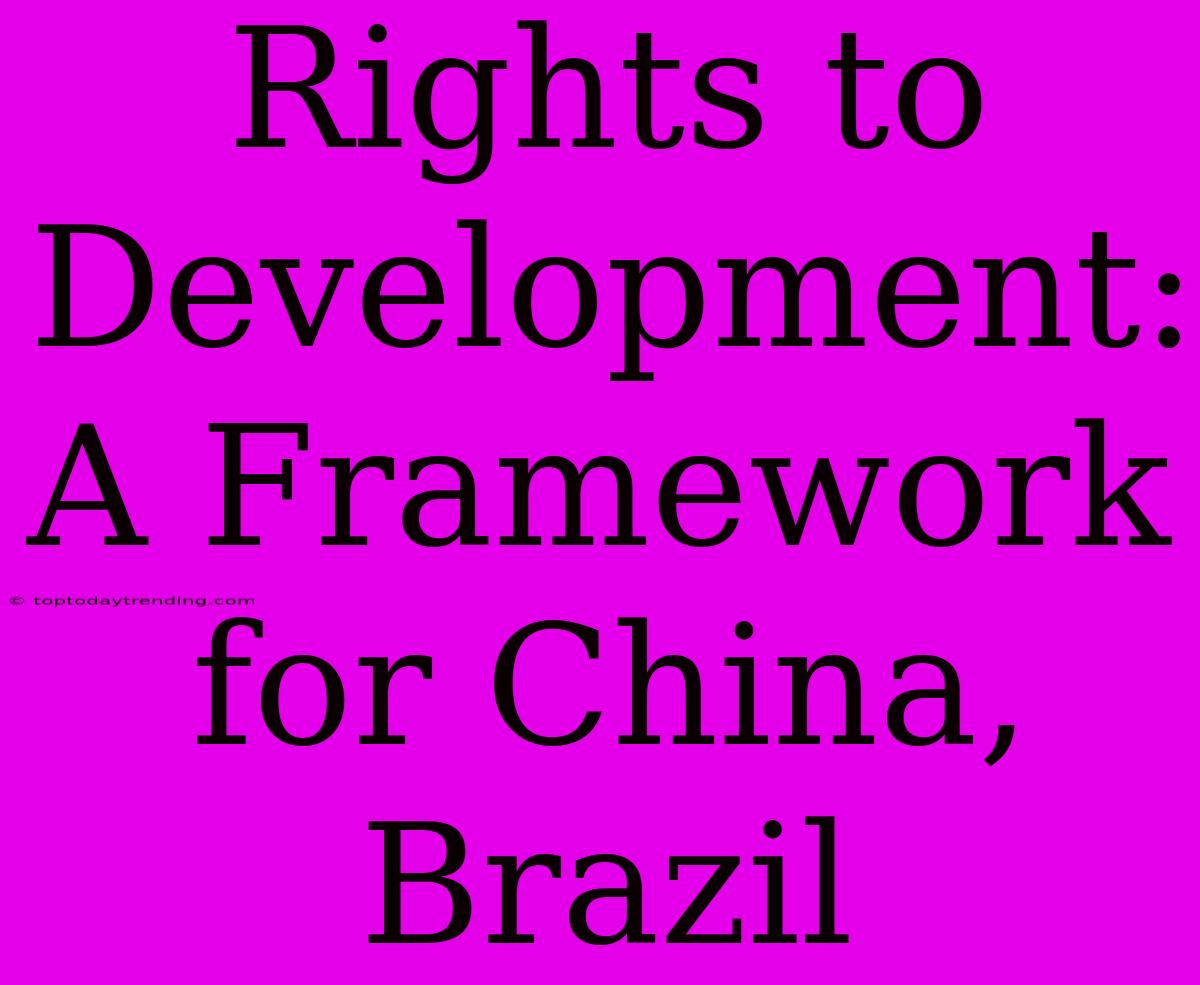Rights to Development: A Framework for China and Brazil
The right to development is a fundamental human right that recognizes the inherent dignity and worth of every person and their right to participate in, contribute to, and enjoy the benefits of development. This concept has gained international recognition and is enshrined in various UN declarations and conventions. While this right is universal, its application and interpretation can vary across nations, leading to unique challenges and opportunities for developing countries like China and Brazil.
A Framework for China: A Giant Strides Toward Development
China's remarkable economic growth over the past decades has undeniably uplifted millions from poverty and propelled the nation into a position of global economic leadership. However, this development has come at a cost. Environmental degradation, income inequality, and social unrest are some of the challenges that threaten the sustainability of China's development trajectory.
China's approach to the right to development focuses on:
- Economic growth: China prioritizes rapid economic growth as the primary driver of development, ensuring basic necessities and improving living standards for its citizens.
- Social welfare: Recognizing the potential for social unrest, China invests heavily in social welfare programs like healthcare, education, and social security, aiming to promote social stability and well-being.
- Environmental sustainability: China acknowledges the environmental impact of its development model and has implemented policies to promote clean energy and sustainable practices.
- Global engagement: China actively participates in global initiatives like the Belt and Road Initiative, seeking to expand its influence and contribute to global development.
Challenges faced by China:
- Income inequality: Despite significant progress in poverty reduction, China faces a widening gap between the rich and the poor.
- Environmental degradation: Rapid industrialization has resulted in significant air and water pollution, posing threats to public health and ecological balance.
- Social unrest: Rising inequality and environmental concerns have fueled social unrest and protests, demanding greater accountability and transparency from the government.
Moving Forward:
China needs to address these challenges by:
- Promoting inclusive growth: Investing in education, healthcare, and social safety nets to ensure that the benefits of development reach all segments of society.
- Strengthening environmental protection: Implementing stricter regulations on polluting industries and promoting sustainable practices in all sectors.
- Enhancing transparency and accountability: Fostering a participatory democracy that allows citizens to voice their concerns and influence policy decisions.
Brazil: Development and Challenges in a Diverse Nation
Brazil's vast size and diverse population present unique challenges and opportunities in the pursuit of development. The country has made significant strides in reducing poverty and inequality but faces persistent social and economic disparities, especially in rural areas.
Brazil's framework for the right to development emphasizes:
- Social equity: Brazil prioritizes social inclusion and equity, addressing historical inequalities and promoting access to education, healthcare, and basic services for all citizens.
- Sustainable development: Brazil recognizes the importance of balancing economic growth with environmental protection and has established national parks and reserves to conserve its rich biodiversity.
- Democracy and human rights: Brazil champions democratic values and human rights, promoting freedom of expression, political participation, and access to justice.
- International cooperation: Brazil actively engages in international development initiatives, promoting South-South cooperation and advocating for equitable global development.
Challenges facing Brazil:
- Income inequality: Despite advancements, income inequality remains a persistent issue, particularly in rural areas and among marginalized groups.
- Deforestation and environmental degradation: The Amazon rainforest faces increasing threats from deforestation, illegal mining, and agricultural expansion.
- Political instability and corruption: Brazil has experienced political turmoil and corruption scandals, hindering progress in achieving sustainable development.
Moving Forward:
Brazil can address these challenges by:
- Investing in education and skills development: Providing quality education and training opportunities to empower individuals and enhance economic productivity.
- Strengthening environmental protection: Implementing stricter regulations to curb deforestation and illegal activities, and promoting sustainable land management practices.
- Promoting good governance and transparency: Strengthening democratic institutions, combating corruption, and ensuring accountability of government officials.
- Addressing historical inequalities: Implementing policies that promote social inclusion and empower marginalized communities.
Conclusion: A Shared Vision for a Just and Sustainable Future
China and Brazil, as leading developing nations, have a vital role to play in shaping the future of development. While their respective contexts and approaches differ, both countries share a common goal of achieving sustainable and inclusive development. By embracing the right to development, both countries can strive towards a future where all people enjoy the benefits of progress in a manner that respects the environment and upholds human dignity.
This article has explored the framework for the right to development in China and Brazil, highlighting key achievements, challenges, and potential solutions. The goal is to promote deeper understanding and constructive dialogue about the crucial role of development in achieving a just and sustainable future for all.

